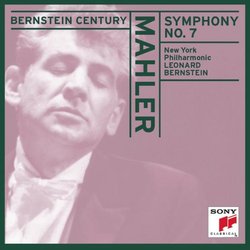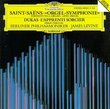| All Artists: Gustav Mahler, Leonard Bernstein, New York Philharmonic Title: Mahler: Symphony No. 7 Members Wishing: 0 Total Copies: 0 Label: Sony Release Date: 7/14/1998 Genre: Classical Style: Symphonies Number of Discs: 1 SwapaCD Credits: 1 UPC: 074646056424 |
Search - Gustav Mahler, Leonard Bernstein, New York Philharmonic :: Mahler: Symphony No. 7
 | Gustav Mahler, Leonard Bernstein, New York Philharmonic Mahler: Symphony No. 7 Genre: Classical
This, Mahler's weirdest symphony, is also his most formally perfect. It was this performance that first conveyed to many listeners the true stature of the music, and it remains on balance a prime recommendation. Because ... more » |
Larger Image |
CD DetailsSynopsis
Amazon.com This, Mahler's weirdest symphony, is also his most formally perfect. It was this performance that first conveyed to many listeners the true stature of the music, and it remains on balance a prime recommendation. Because Mahler is best known for his brilliant orchestration and hyperemotional sensitivity, it's easy to forget just how well put together his symphonies are. This one, for example, has five movements symmetrically arranged around the creepy central scherzo. The two outermost movements are thematically related, and the next two on either side of the scherzo both have the title "Night Music." What Leonard Bernstein does better than just about anyone else is to present with compelling logic and balance the symphony's musical progression from darkness to light. Poise was not generally regarded as one of Bernstein's strengths. Untrue. Just listen here. --David Hurwitz Similarly Requested CDs
|
CD ReviewsHaunting and beautifully crafted. Jeffrey Lee | Asheville area, NC USA | 03/28/2004 (5 out of 5 stars) "Particularly with the Seventh, I have little desire to analyze what Mahler is trying to say. I'm satisfied simply to let myself be taken along the river of the composer's musical consciousness. Currently, my preferences for this piece are Tennstedt and this first Bernstein New York Philharmonic account. Like some, I find a number of the performances in Bernstein's second set (with different orchestras) often mannered and slow. By contrast, I would place a number of his readings from the first set at or near the top of the list of individual Mahler recordings. I am of the same opinion regarding Klaus Tennstedt's sincerely executed and mostly very satisfying collection. Some prefer Tennstedt to Bernstein because they feel he tends to avoid imposing his personality on the music in the way the latter does. Well, in most of his Mahler (with reference to his New York Philharmonic set, not his later one) I really don't have this problem with Bernstein. His somewhat "personal" interpretations are typically a plus for me. Though I very much enjoy both Tennstedt and Bernstein in the Seventh, I would not make a choice at this time as to which one I find preferable. Tennstedt is very effective at clarifying textures and fleshing out details. In this regard, he is aided significantly by the EMI sound engineers. His entire performance also brims with earnestness and intensity. Especially imposing is his last movement, which impacts with an intoxicating sense of excitement and splendor...Bernstein's Seventh is one of the very few performances of a Mahler symphony I give near unconditional praise to. It might constitute the finest reading in his Mahler repertoire. He achieves a natural musical flow throughout, and elicits an especially enchanting quality from this interestingly variegated work. From the beginning, he permits no softness or slack, yet still is able to realize a mellifluous presence, especially in quieter, more mysterious passages. While his rondo finale is very fine, I feel it doesn't quite match the grandeur of Tennstedt's, whose effort here sounds close to being inspired. All things considered, I wouldn't be without either of these Sevenths. For those who want a complete set of the Mahler Symphonies, I would go with either the Tennstedt/London Philharmonic, Bernstein/New York Philharmonic or Kubelik/Bavarian Radio set." Bernstein in the Mahler Seventh--which one to choose? Santa Fe Listener | Santa Fe, NM USA | 11/04/2005 (5 out of 5 stars) "After his first Mahler cycle in New York (Sony), Bernstein returned to his home orchestra three times, for the Second, Third, and Seventh Syms., in his second cycle on DG. He more or less owned the Seventh, which he instinctively understood wtihout having to underline and exaggerate. I'd like to compare the 1965 and 1985 versions, keeping in mind that both have been cited as the "best ever." Sound: The 1965 Seventh has excellent, clear analog sound. It was made in Avery Fisher Hall, like the later version, and the engineers put us midway back in the hall, so there is no spotlighting. Delicate overlapping and ensemble are more important than visceral impact. The DG engineers move us into the heart of the orchestra, which makes the sound brighter, more immediate and intense. The DG sonics are still clear, though, and digital glare is minimal, thank goodness. Tempos: In both readings Bernstein stays well within normal range, and until the last movement he keeps the same speeds, exactly so in the long first movement. But the finale in 1985 is almost 4 min. slower--Bernstein has abandoned his earlier thrilling rush. However, the sonics are so much more immediate in 1985 that the two come out about equal in exhilaration. Interpretation: British critics fostered the canard that Bernstein was excessive in Mahler and grew more so with age. In fact, the 1965 reading is quite delicate and full of finesse; it was Bernstein's genius to catch all the nuances without losing the shape and momentum of the symphony--nothing is remotely fussed over. The 1985 reading is equally detailed, but there is more expressive underlining, to be sure. We are clearly hearing the same basic performance, although the orchestra, perhaps because they are playing live in concert, is scrappier at certain points in 1985 (note the sloppy opening to the finale) than their impeccable coutnerparts twenty years earlier. Overall, I expected a bigger difference than I heard. Of these two great performances, if you want more detail and naturalness in the interpretation, pick the 1965 version, which is much more economical on its single mid-price Sony CD. If you want sonic impact and the added livelines of a concret, pick the 1985 version on two full-price CDs from DG (not even a filler). Mahler has become such a staple that there are quite a few Sevenths of stature, including Rattle's from Birmingham, both of Abbado's from Chicago and Berlin, and Klemperer from London (the latter is slow and sometimes very slow--be advised). I find both versions from Tilson Thomas lightweight and fussy, and the fascinating Scherchen is stuck with raw recording and an equally raw orchestra--but far from the worst he ever had. I remain happy with both Bernsteins, yet having heard a transcendent Mahler Seventh from Welser-Most and thhe Clevelanders, I will rush out to buy their CD the moment anyone decides to record it. " Groundbreaking Serpentor | Groesbeek, Netherlands | 07/13/2006 (5 out of 5 stars) "So often Mahler's most ambiguous symphony is conveyed by the greatest orchestra's and most lauded conductors, without a real trace of soul, commitment or just plain guts. Though, mind you, on it's very own merits Mahler 7 is a fantastic orchestral experience, magnificent even when it's just played professionally. However, if you like to be swept away, if you want to experience the heart and soul of this very important symphony and witness the true struggle through the lonely night into the bright and exuberant arrival of daylight, one really has to hear the 'Song of the Night' like it's performed here.
Bernstein is an absolute authority when it comes to Mahler's Seventh. His reading of the Seventh with the New York Philharmonic for his 80's DG Mahler cycle was one of the high points and this version, the CBS (now Sony) 60's landmark recording with the same orchestra, changed the course of history for this very symphony. As it's true better recorded versions exist (Tilson Thomas/London, Haitink/Concertgebouw/2nd recording, Abbado/Chicago, Inbal/Frankfurt), none of those reach the same solidity, virtuosity and vision embodied in Bernstein's. It's magical, soulful, grand, intimate and above all... groundbreaking. This is what Mahler is all about." |

 Track Listings (19) - Disc #1
Track Listings (19) - Disc #1








